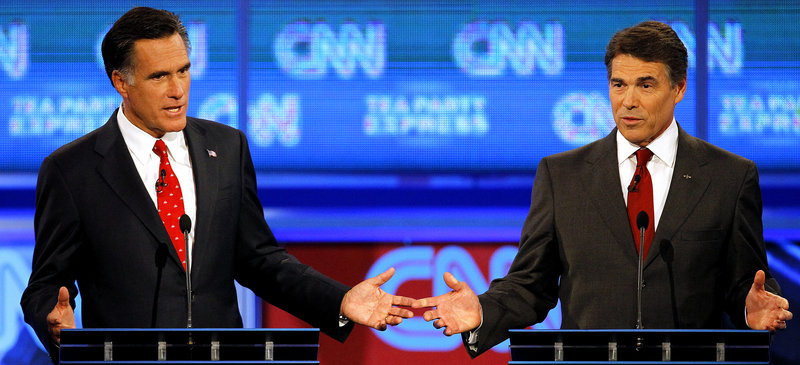In Monday’s debate, the candidates squabbled among themselves over issues that might best be described as “inside baseball” and barely addressed the nation’s all-consuming obsession: the economy. Rick Perry must be starting to feel a little like that coyote he shot a while back.
This time around, it’s Perry who’s under the gun and wearing a bull’s-eye on his face, so to speak.
The rhetorical lead was flying at, around and straight through the Texas governor during Monday’s televised debate in Tampa, Fla., as his seven rivals for the Republican presidential nomination paid tribute to his newly won front-runner status by making him the focal point of their intramural wrath and ridicule.
To his credit, Perry weathered the onslaught with good humor, if not always great answers to the questions that were hurled at him and the verbal land mines that were strewn in his path by his fellow candidates and debate moderator Wolf Blitzer of the Cable News Network.
Previous front-runner Mitt Romney and the other GOP hopefuls have made Perry feel as welcome as a gate-crasher since he barged into the race on Aug. 6. The aspiring commanders in chief were in no mood for fellowship by the time they all gathered for the CNN/Tea Party Express debate at Tampa’s Florida State Fairgrounds.
Perry was forced to defend himself on topics ranging from Social Security (does he really think it’s a Ponzi scheme?) to vaccinations for young girls (why in the world would he order Texas kids inoculated against a sexually transmitted disease that causes cervical cancer?) and just about everything else he has said, done or written during his long political career in the Lone Star State.
The jury is very much out on whether Perry can withstand the in-house barrage through future debates, party caucuses and presidential primaries, not to mention the national media scrutiny and assorted potshots from Democrats who would rather see Perry washed out in the preseason than go one-on-one against President Obama in the 2012 election.
There is no shortage of “expert” opinion suggesting that Perry’s relatively sheltered background in Texas may have left him woefully unprepared for the national spotlight that has wilted so many presidential candidates before him — even some who jumped into the campaign with a big splash only to float quietly into the sunset, adrift on a raft of auspicious beginnings and failed aspirations.
Can we say “Howard Dean,” boys and girls?
Rick Perry is no Howard Dean, of course, and he can thank his lucky stars for that. So far, at least, he has stayed calm and focused, neither smitten with his sudden national notoriety nor intimidated by the array of media critics and political opponents aligned against him. On the other hand, it’s early in the game. We’re still months away from the first caucuses and primaries; Perry could march on to the nomination or find himself back in Texas hunting coyotes long before next year’s scorching summer.
Meanwhile, the Republican campaign continues to be a bafflement. In Monday’s debate, the candidates squabbled among themselves over issues that might best be described as “inside baseball” and barely addressed the nation’s all-consuming obsession: the economy.
The man who the eight candidates want to unemploy, President Obama, has been barnstorming the nation in support of his recently unveiled jobs program, and yet the GOP debate was weirdly devoid of proposals for putting Americans back to work. Perry, ex-Massachusetts Gov. Romney and former Utah Gov. Jon Huntsman argued about whose state produced the most — or least — jobs on their watch, but offered virtually nothing in the way of a jobs plan for the country. At some point, it won’t be enough to simply blame Obama for the unemployment problem; voters will expect the president’s opponent, whoever he or she may be, to offer a solution.
Republicans have scored lots of political points in recent weeks and months by blasting Obama for his failure to propose a specific plan for improving the economy. Now that he has put a plan on the table, they’ll be hard-pressed to reject it without offering an alternative — or forfeiting any claim to credibility on economic issues.
Republicans in Congress seem content to oppose the Obama plan and wait for a Republican president to take office in January 2013. But unless Obama’s would-be successors start focusing on the economy instead of each other, defeating Obama might be easier said than done.
Send questions/comments to the editors.



Success. Please wait for the page to reload. If the page does not reload within 5 seconds, please refresh the page.
Enter your email and password to access comments.
Hi, to comment on stories you must . This profile is in addition to your subscription and website login.
Already have a commenting profile? .
Invalid username/password.
Please check your email to confirm and complete your registration.
Only subscribers are eligible to post comments. Please subscribe or login first for digital access. Here’s why.
Use the form below to reset your password. When you've submitted your account email, we will send an email with a reset code.